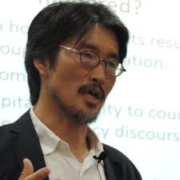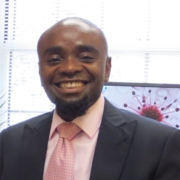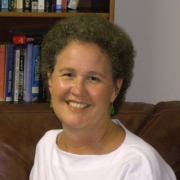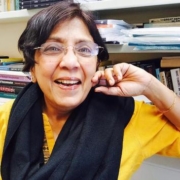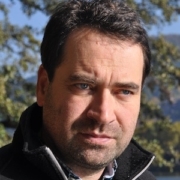You Yun
SEL Critiques and Alternatives
Today You Yun joins me to talk about Social-Emotional Learning. She critiques the approach to SEL advocated by western organizations by showing how conceptions of the self, other, and emotions are not universal. By exploring these concepts from Confucian and Daoist philosophies, she begins to show alternative ways to think about SEL.
You Yun is an Associate Professor in the department of Education at the East China Normal University. Her new article is Learn to become a unique interrelated person: An alternative of social-emotional learning drawing on Confucianism and Daoism, which was published in Educational Philosophy and Theory.
Citation: Yun, You interview with Will Brehm, FreshEd, 294, podcast audio, September 26, 2022. https://freshedpodcast.com/you/
Will Brehm 0:10
You Yun, welcome to FreshEd.
You Yun 1:19
Thank you, Will, for this great invitation. Very honored to be here. Thank you.
Will Brehm 1:20
I’m thrilled that you are here. Can you give me a sense of the sort of popularity of this term social-emotional learning in what we might call this sort of global education discourse? I mean, I hear it quite a lot. What is it?
You Yun 1:37
Actually, the notion of social-emotional learning – or in some cases, people will refer to social and emotional learning – emerged in the early 1990’s. So, first in the US, and then it has been soon spread to Canada, the UK, Singapore, Finland, and more recently, to China, and in the forms of like ideas, programs, or curriculum by a range of scholars, organizations like UNICEF, and also the one called CASEL, which is the Collaborative for Academic, Social and Emotional Learning, and some private companies. And something I’d like to highlight here is since 2018 actually, the OECD has formally joined this global trend by launching its study on social and emotional skills, which can be simply seen as its noncognitive version of PISA. So, students from nine countries were measured for their social-emotional skills for the first round, and the second round is ongoing now. So, whether it will reproduce a kind of like shock, like PISA did is to be seen but I think predictably it will continue to draw attention from scholars, practitioners, and policymakers as more member and non-member economies get involved.
Will Brehm 2:55
Why would UNICEF and the OECD and all these different private organizations that you’re sort of mentioning, why do they see value in social-emotional learning (SEL for short)? What is it that they find so important for us to focus in on those topics?
You Yun 3:12
Actually, if we trace back to its origin in the 1990s, we can see the emergence of this notion and the popularization of this notion can be related to the widespread ideas of emotional intelligence, and also the development of neuroscience in emotions. So, they describe social and emotional skills as something measurable and the teachable, and contributing to individual wellbeing and social progress, etc. And the assumption is that the increased social and psychological vulnerability and behavior crisis of children and youth have been primarily resulted from the overemphasis on academic achievement, and also the overlooking of non-academic development. And they do believe education can and should play a role in teaching social management, emotional regulation skills. And also, some scholars have argued that social-emotional learning can facilitate academic learning.
Will Brehm 4:17
Okay, so there’s a lot of different reasons why it might be interesting to look at social emotional learning (SEL). So, obviously, there’s value to it but then what it means probably takes different forms depending on which organization or which framework you’re looking at. So, you said you look at this Collaborative for Academic, Social and Emotional Learning Framework. Can you explain exactly, what is that framework? How do we actually operationalize some of these ideas? What are these emotions that we are interested in?
You Yun 4:47
This organization, why I look at them, I’d like to speak a bit about that, because this is the first organization to propose this idea. And also, it’s kind of like the main organization that promotes this idea all over the world. So, I look at the framework they provided. I mean, if you go to the website of this organization, you can see a figure. And there are five core sets of skills identified by this organization and displayed in their figures. So, namely: self-awareness, self-management, social awareness, relationship skills, and responsible decision-making. So, if you look at the figure of the framework, you will see these are five domains organized in a wheeling-like structure and displayed in three colors. So, it seems like they are categorized into three parts, which I often refer to: the self, social relationships, and social-self interaction. So, about self, these two domains, they denote understanding and managing one’s emotion to achieve individual aspirations and goals. And the emphasis of the two social domains is on understanding the emotions of others from different backgrounds, emphasizing with them, and by which establishing positive relationships, and also effectively navigating settings. And the last domain is focused on making responsible choices for personnel, social, collective goals, and the well-being. So, that’s the main idea of this notion and this framework.
Will Brehm 6:22
And so, this organization, you said was the first one to put together this framework, it seems quite in a sense, comprehensive framework for SEL -what’s the reach of this framework? Is this being utilized in schools and in policy documents around the world? What do we know about its reach?
You Yun 6:40
This organization is based in the US. So, that’s why I say it started from the US. So, as I read from the references, it says, like all 50 US states now have the social emotional standards for preschools and 18 states have standards for K-12. But what I can say is like more often, the applications are indirect. So, they do have this framework, and it has been adapted into another framework and using other countries. And also, I have another example, which is also part of my research. So, I do look at an organization also based in the US called Committee for Children (CFC for short). So, there is no explicit citation of CASEL’s framework in CFC’s, SEL curriculum materials but this curriculum was actually sent to be rated by CASEL and also recommended by CASEL for the commercial uses. And also, when I read the report from CFC, it says that this curriculum has been used in schools in more than 70 countries around the world. So, it sounds quite prominent.
Will Brehm 7:49
And is there any connection between the CASEL framework and the what the OECD is doing? I mean, is there overlaps in any ways, do you know?
You Yun 7:57
They do. In OECD’s report, they do mention CASEL a few times but they didn’t really make a connection between these two things. Instead, OECD was more focused on another framework called the Big Five, something huge in psychology, I think. So, they say our framework is based on the Big Five personality inventory but they do mention the CASEL, and they reference the CASEL a few times.
Will Brehm 8:24
So, it’s quite interesting. So, there’s these different sorts of frameworks to think about and sort of operationalize these ideas of SEL for different organizations for different purposes. There are some overlaps but definitely different ways of thinking through what SEL is. Now, I want to sort of turn to the main point of your recent article, which is to really think through the ways in which some of these frameworks are sort of advancing or built on a particular Western philosophy. Can you just sort of tell me how CASEL in this instance is sort of built or replicating, reproducing particular Western philosophical traditions and assumptions?
You Yun 9:06
Thank you for this question. So, as I mentioned earlier, this framework is for CASEL. I said that is five sets of skills, which are categorized into three parts, right. I said the self and the social relations. So, you can see the rationale for these categorizations is that self is independent from one’s social relationship. That they are completely separated different things. So, accordingly, it seems that the emotional skills that concern self and others are separated, which means that a person’s emotion can be individually developed without engaging with others. So, you just growing up by yourself and develop your emotion skills by yourself. In other words, although we can see if you look at the framework and read their explanations, you can see they use words like “caring”, “sympathy”, “community” a lot but fundamentally others are not constitutive of self, but the object of one social emotional skills which should be developed in another domain. And if we read the explanation for the skills, words like “identifying”, “reflecting” or “evaluating”, “analyzing”, “demonstrating”, “showing”, “regulating”. All these words are used so frequently in this framework, it seems that it is evident that, as I quote, Diane Hoffman, who is an American scholar, she wrote this in her paper, she said that “Emotion per se is not the focus. Rather, it is the cognitive processing of emotion that is important in CASEL’s Framework”. That’s her comments on CASEL’s framework, and I agree with her. So, it seems like the emotions are to be rationalized in order to be further managed and expressed. And if we read the ethnography studies, and also philosophical studies we can see this kind of notion of how emotion should work in the society is in accordance with what I just mentioned, as we can see in the framework.
Will Brehm 11:06
And these sorts of assumptions of how emotions work, and how to sort of conceptualize the self and the self’s relationships to others. Is this based on particular Western philosophy? Do you think?
You Yun 11:19
Probably not a particular Western philosophy. It’s quite general, I would say. And probably some scholars might argue this is not the whole Western philosophy. Of course, you have diversities, and different philosophers have different arguments. But in general, I would say the Western modernity or Western liberalism would echo this kind of notions of self and emotion.
Will Brehm 11:42
I guess it sort of begs this question: if CASEL’s sort of assumes these particular ways of understanding the self and the other and emotions, and yet it’s being used potentially, in all these different countries around the world. And PISA is now trying to test it in all different parts of the world, of course, is there an issue of sort of cultural inappropriateness of this framework?
You Yun 12:06
I do think so. And I’d like to explain why I think so. As I mentioned that in my own papers, and also, many other scholars work, we have argued that the notions of emotion, self-other relationship are conceptualized in a way that is in striking contrast to how these notions are approached in Western modern societies. I think that’s something I already probably mentioned. And then I mean, in response to the cultural related critics, so it’s not just me criticizing CASEL, is actually has been criticized by different scholars in the US, outside of the US from different perspectives already. But we can see how CASEL responds to these cultural related critiques. On the one side, they have rhetorically supported the increase of what we call cultural responsiveness, cultural sensitiveness, and the cultural adaption, etc., etc. They have different words, terms for that in SEL implementation. On the other side, they have insisted on a shared understanding of social-emotional learning (SEL). So, it seems to me that for CASEL, what you can change is merely how to teach the fixed universal sets of skills cross cultures as they have identified. So, this kind of adaption, which lacks the ontological reflection across different cultures or philosophies, in my view, would be rather superficial and limited and in this way, I would say it’s culturally inappropriate.
Will Brehm 13:37
That’s really interesting. So, in other words, you’re saying the notions of self and other and emotions are sort of understood as being these universal concepts. And the only thing that has to change is the way in which we teach them in different countries not actually changing those particular concepts.
You Yun 13:57
Exactly. So, the paper I’m writing -it’s under review now- is actually providing an example of how this CASEL curriculum tried to be transferred to a Chinese kindergarten. And during the whole process of the transfer, they were being told that what you can do is actually change the character’s name. So, change it to a Chinese kid’s name. And also, this story is not happening in the US anymore. So, you need to draw a picture as the typical kindergartens in China. So, that’s the only thing they can do during the whole transfer process.
Will Brehm 14:35
So, it then sort of brings us back to: if these concepts of self and other and emotions are not universal, how can we think about them in other cultures outside of say, this Western canon? And in your article, you look at two particular sort of traditions that come out of China. And of course, have influenced many countries in Asia particularly and that is of Confucianism and Taoism. So, in Confucianism, how might we think about these notions of self and others and our emotions?
You Yun 15:09
Many philosophical scholars have elaborated the interrelated nature or someone would say related nature of selfhood in Confucianism. So, basically interrelatedness – that’s the word I use for my article. I also quote Chinese I think he might be Chinese scholar Yao. So, he said that “Self is a relation formed and reformed in one’s engagement in family and social communities”, which means that who we are depends on who we live with, and especially for Confucian is who we learn from. But this does not mean independent autonomous selves form a kind of external relations but a person can only become what she or he is in relation to others. So, that means that relationship is part of oneself; it’s not external to oneself. I mean, I think these kinds of similar ideas have been elaborated in a prominent work by Markus and Kitayama. In their paper published a 1991 they conceptualize the independent self and the interdependent self. I think that would be really helpful if I didn’t make the idea clear then maybe you can go to that paper for more details about what I’m saying now. And then also another point I would like to highlight to help us to understand the selfhood in Confucianism is this kind of idea where you share part of yourself with others in these interrelated relationship this does not mean selflessness or simply obeying to external authority as the term collectivism might indicate. Because I use the term ‘interrelatedness-cum-uniqueness’ to highlight that there is a sense of uniqueness in the Confucian notion of self. But this kind of sense of uniqueness is different from the Western liberal sense of uniqueness because for Confucianism, a person is unique but it’s not because of the internal attributes of her or himself but because this person, his or her specific ethical roles and the relationships with others and in the society. So, you are unique, not because of yourself, but because you are in specific, particular relationships with the surrounding others. So, that’s the Confucian notion of self. And based on this notion of self, I’d like to emphasize two key words to elaborate emotion in Confucianism. The first one is authenticity, and the other one is appropriateness. And we cannot really separate these two words. When we consider the notion of emotion, we need to make that as a whole. But when we elaborate it properly, we need to elaborate in an authentic way. So, sensitivity, stress, emotions being felt hard, so you need to feel that right. And also, they encourage you to express emotion as how you feel. So, emotions should not be deliberately constrained. So, that’s the first thing. But this does not mean emotion should be given completely free rein because emotion in Confucianism, it’s molded through rituals, or in Chinese word, it’s [Li?] and these rituals are originally set up based on the ideal of how authentic emotion should be appropriately experienced and expressed according to one’s ethical roles and their relationships. So, Confucianism would emphasize that any person needs to learn how to emotionally respond to interrelated others in appropriate ways through observing and participating in rituals.
Will Brehm 18:58
Okay. So, it’s clearly clearly different than some of these Western notions that you’ve explained earlier. How does this compare to Taoism? Are there overlaps? Are there differences? How might we understand self and emotions from sort of a Taoist point of view?
You Yun 19:13
First thing I’d like to clarify is there are many distinctions, differences and tensions between notions and approaches in Confucian, Taoist thoughts, but my paper was specifically focused on their commonalities in terms of selfhood and emotion. So, based on this I can probably reimagine alternative ways of doing social-emotional learning right. So, I will say that’s what I focused on in my paper and the Taoist self can be understood through the notion of wuwei (无为). So, literally it means “non-I” or no self. But rather than entirely rejecting the sense of self, wuwei indicates a kind of, I would say, “no-self self”. It sounds a bit confusing, but I would explain that by taking Zhuangzi as an example – that’s my favorite philosopher by the way. So, for Zhuangzi, this no self-self specifically means losing a fixed, egocentric self through a series of strategies of self-deconstruction and reconstruction. For example, xinzhai (心斋) English is fasting of mind or zuowang (坐忘) means sitting in forgetfulness, and wuhua (物化) which is transformation of things. So, through all these strategies, Zhuangzi would say that you can become a person who can broaden your vision by merging that with others, and ultimately be aligned with Tao. That’s another philosophical notion in Chinese philosophy. I think, simply speaking, we can understand it as the running of the universe. So, you are getting off the fixed, egocentric self but you still have a self. But this self is allowing you to transform yourself into someone else, or into another kind of non-human beings. And by doing that, you would understand seeing the world from their perspectives. So, Zhuangzi would say, this kinds of emerging or alignment does not wipeout the diversity of all particular things. So, it doesn’t mean when you transfer yourself into another, that you become the same with another. It’s not that. It’s more like in Chinese, Zhuangzi would say qierbutong (齐而不同) So, what he means is basically everything is in accordance with the running of the universe, but in their own ways. But by understanding each other, emerging with each other’s perspective, broadening your own visions, you may understand how the universe is running.
Will Brehm 21:53
So, that’s how Taoism might understand self, non-self-self – I really like that. What about emotions? How would Taoism understand emotions?
You Yun 22:02
Yeah. So, similar like in the format of wuwo, it’s like a ‘no I’ or ‘no self’. So, it’s similar to that. That Taoist notion of emotion. We can understand through the notion of wuqing (无情) So, it (literally) means without emotion, with no emotion. But again, wuqing does not denote emotionless. So, even the wise men – that Zhuangzi would admire – also have emotions as ordinary people do. But they respond to things emotionally but are not disturbed by emotions. So, I would say rather than free from emotions, wuqing would means free for emotions by, as I just mentioned, broadening your emotion parch, or prospective with the whole word or with everyone surrounding you. And also seeing all things from emerging versions of Tao and knowing that everything is ontologically undifferentiated, and all the circumstances are changing all the time. So, rather than emotionally fixed with one moment, one thing, or one perspective. So, these two notions, no self-self and this wuqing are kind of like in the similar way of understanding the world and the relationships. And also, with the self-cultivation of breaking the ego-centeredness, you will be able to attend into the nature of all things, embracing multiple perspectives and also to be spontaneous. That’s why I keep on saying, in my paper, I emphasize that authenticity not just for Confucianism but also for Taoism. Because you need to respond to things spontaneously be true, be real in this way, but also reflect the alignment between one particular nature and the environment and the surrounding others. In this way, you will be emotionally responding to things in an appropriate way.
Will Brehm 23:51
Right. So, authenticity, appropriateness, interrelatedness, these are some of the key concepts that we must understand to understand SEL from a Confucian or Taoist sort of perspective. But let’s take that further. Like what would some sort of alternative model of SEL look like, in your opinion, based on some of these alternative philosophical foundations?
You Yun 24:14
In my paper, this part is the later part of my paper. And I will say just right now, I can only share some initial thoughts. I think that it requires more work. And further and deeper thinking in the future research. So, I actually highlighted three points. So, the first thing is, as we mentioned that from the Western liberal or modern perspective, selves, is at the center and also, it’s separated from others, right? So, the first thing I’d like to highlight is the focus of SEL should not be how children develop their social and emotional skills to be able them to live well and successfully in the society but rather a group of children to learn with each other about how to harmoniously live in the community with sufficient and concrete emotional bonds by actually building these bonds. So, it’s not like I teach your children what should be the social emotional skills that you develop but rather to let them communicate and act with each other and building this very strong and also concrete, emotional bonds. That’s the first thing I’d like to highlight. And the second point is, as I can see – because I observed how the curriculum was implemented in Shanghai kindergartens – and I can see the core of the curriculum is like teaching you about the knowledge about various emotions, and all these kinds of skills of operating emotions like deep breaths, counting exercises, this kind of thing. But for me, we can get inspired from the Confucianism and Taoist perspectives. Probably the more important thing is to cultivate one to be able to experience the emotional interrelatedness. And I just mentioned earlier, if you look at the framework, they actually didn’t use that word for emotion. For example, “feel”, “experience”, they rarely use these words. So, what I’m trying to say is to enable children to experience emotion bonds, and also interrelatedness in their unique in contents with their surrounding others. So, the attention of the children should be directed to the interactions in shared events between everyone rather than focus on how I feel, how should I express my feeling, etc. And the last one, I will say, through social emotional learning why it’s expected to appropriately attend and respond to others’ skills, aspirations and feelings in emotional interactions. And this is not for the purpose to assert one’s personal trait to say that, “Oh, you are actually a great person”, because you can do that or express oneself as emphasizing Western notions of self that you need to be able to clearly make your points right to express how you feel. So, it’s not about that. The point is, as one attends and responds to other people’s emotional life, both sides, both people can live in a fulfilled emotional life. So, I would say these three kinds of shifts from the individual centered and expressive emotions to more interrelated, kind of like emotion learning.
Will Brehm 27:37
It’s so fundamentally different in a way from -it’s a complete change in how we would even approach SEL. What about connections to sort of the non-human world? In our interrelatedness with our environment does that go beyond other humans?
You Yun 27:55
Yes, yes. It goes beyond other humans, including other non-humans, and even those probably with no life. Because if you read my paper, I think the second example I used, it’s actually not from me, it’s like sharing what I observed from the SEL curriculum with a teacher that I do in this training program with and then when I asked them, “How do you think about this example”, and they replied that they actually include the little boys toys, and also the boy’s mother and the boy. They will say they have this kind of like in a shared event. So, how can we understand their relationships? So, for me, it’s quite natural that you build this relationship with non-humans and those things without life. But what we can see in the current -I mean, what more than education- is we have long treated non-human others as kind of like objects that we need to learn about. So, it seems that they assume there is a human social world separated from the natural non-human world and I assume probably that’s why they call it a social-emotional learning because they can see like, we are living a social world. But in Chinese, we always say the heaven, the earth, and everything in-between. So, which is tiandiwanwu (天地万物) So, if we join on the Taoist perspective, all things in between are, as I mentioned, ontologically undifferentiated and united as one. So, we don’t just encounter other human beings in our life. How we interact with non-humans that are involved in our interrelated contexts as constituting us and vice versa. So, I would say in relation to others, there was a self and in relation to non-human, there is human. That’s how I understand their relationships from the Taoist perspective. So, we need to learn how to feel and attend to our coexistence with all others in between the heaven and earth and appropriately respond to that kind of like coexistence.
Will Brehm 29:59
So, by way of, a final question here: this sort of alternative approach that you are starting to articulate here, do you think it would ever be taken up by some of these big international organizations advancing and pushing SEL as something that should be taught and learned in school? I guess, in other words: do you think the OECD framework, when it gets translated into Chinese, would actually include some of these different philosophical starting points that you have articulated here? Like, How hopeful are you that that will happen?
You Yun 30:35
Well, honestly, actually, that’s the question I asked myself all the time. I was just thinking, what the implication could be for those kinds of like research if it’s never reached to the organization? And also, like, you know, with their big influences on the national policy makings, and especially now in China. China is one of the countries getting involved in these studies on social and emotional skills surveyed by the OECD. And they’re kind of treating it like a big thing in China, people are really proud of doing this. But for me, it’s like I just keep on criticizing things. And I’m not very sure. So far what I can say so far, I cannot see any sign of acknowledgement and embracement of non-Western philosophies in their perspectives. I mean, especially let’s see OECD, for example. I mean, in 2014, I think like a group of international scholars already wrote an open letter to Schleicher, right. And especially mentioning that measuring great diversity of education, cultures, traditions, by using just one single and narrow yardstick would be quite dangerous to our students and education. But we can see no response from the OECD. And more specifically, analyzing the framework, the OECD is using now – the big five model – for their surveys, nothing has really changed. They just keep on saying that, if we just change the language and make it contextualized in some way, then this framework can be used across cultures. So, nothing really changed. I guess they’re just not bothered,
Will Brehm 32:14
I think what you’ve done is you’ve raised a fundamental critique of what they’re trying to do. And if they respond to it, they sort of agree, in the end, with your critique. And so, it’s easier to just not say anything. Well, You Yun, thank you so much for joining FreshEd. I mean, it was just enlightening. There was just so much to learn from you and from your work. So, thank you so much for joining and please come back when you have developed this whole alternative way even more. Thanks again.
You Yun 32:39
Thank you so much.
Want to help translate this show? Please contact info@freshedpodcast.com
Related Guest Project/Publications
An Alternative of Social-Emotional Learning Drawing on Confucianism and Daoism
Mentioned Resources
History of Social Emotional Learning
Collaborative for Academic, Social and Emotional Learning (CASEL) Framework
Committee for Children (CFC) Holistic SEL Approach
SEL in US K-12 State Education
Diane Hoffman – Reflection on Social Emotional Learning
Markus and Kitayama(1991) – Culture and the Self: Implications for Cognition, Emotion, and Motivation Rethinking Emotions in Confucian Political Philosophy
Conceptions of Self/No-Self and Modes of Connection in Classical Chinese Thought
An Open Letter: To Andreas Schleicher OECD
Social and Emotional Skills – OECD
First Results from the Survey on Social and Emotional Skills
Recommended Resources
Toward Transformative Social and Emotional Learning: Using an Equity Lens
How Social-Emotional Learning Helps Children Succeed
Selfhood and identity in Confucianism, Taoism, Buddhism, and Hinduism: Contrasts with the West
Humanity and Self-Cultivation: Essays in Confucian Thought
Confucian Ethics: A Comparative Study of Self, Autonomy, and Community
The Concept of Emotion Revisited: A Critical Synthesis of Western and Confucian Thought
Confucian Self-Cultivation and Daoist Personhood
Nothingness and Selfhood in the Zhuangzi
“Emotions that Do Not Move”: Zhuangzi and Stoics on Self-Emerging Feelings
Emotions and agency in Zhuangzi
Teachers’ Perceptions of Social Emotional Learning in Early Childhood Centers in Shanghai, China
(Un)Standardizing Emotions: An Ethical Critique of Social and Emotional Learning Standards
Critiquing Social and Emotional Learning: Psychodynamic and Cultural Perspectives
A Problematic Nature and Assessment of Children and Young People’s Social and Emotional Learning
Have any useful resources related to this show? Please send them to info@freshedpodcast.com

